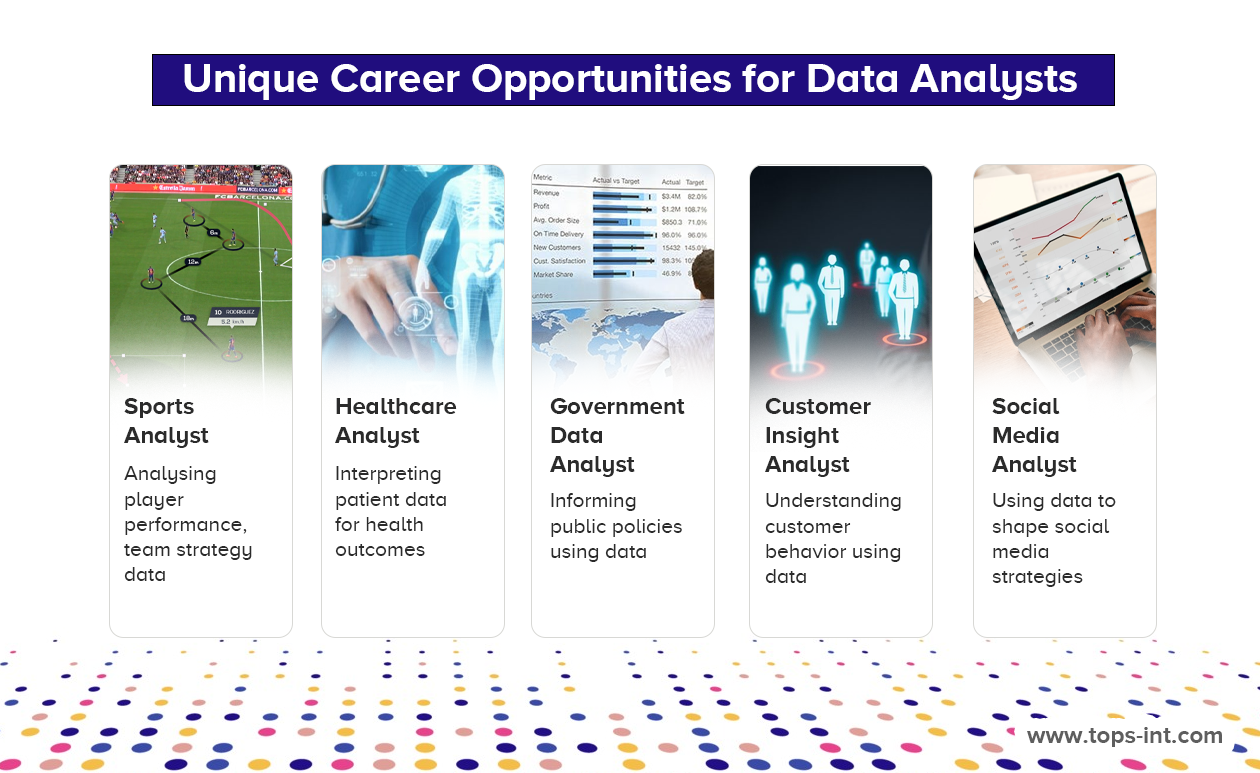A Data Analyst is a professional who scrutinises information using data analysis tools. The meaningful results they pull from the raw data help their employers or clients make important decisions by identifying various facts and trends. Recently there has been a 120% rise in the demand of Data Analytics Courses in Ahmedabad and other tech hubs in India! This is due to the growing demand of data analysts!
Key Responsibilities and Duties
Data Analysts have various tasks on their plates:
- Data Cleaning – They ensure the data is accurate and error-free.
- Data Analysis – They scrutinize data to find useful information.
- Data Reporting – They summarize their findings in easy-to-understand formats for stakeholders.
Essential Skills and Qualifications
The data analyst field requires some specific skills and qualifications:
- Educational Qualifications – Usually, a degree in fields like math, statistics, economics, or computer science.
- Technical Skills – Proficiency in SQL and a good understanding of data warehousing concepts are a must.
- Soft Skills – They should have excellent analytical and problem-solving abilities, plus a knack for conveying complex ideas in simple language.
Here we will discuss the step-by-step process you need to take to become a data analyst:
- Develop a Strong Foundation in Mathematics and Statistics
- Master Data Analysis Tools and Technologies
- Pursue Relevant Education
- Gain Practical Experience
- Develop Analytical and Problem-Solving Skills
- Network and Connect with Data Professionals
- Apply for Data Analyst Positions
- Ace the Interview
Step 1: Develop a Strong Foundation in Mathematics and Statistics
The first step to succeeding as a Data Analyst is to become an expert in math and statistics. This is how:
Dive into mathematics
Hone your probability, calculus, and algebra skills. Even though you may not employ complicated equations daily, solid math skills can assist you in grasping the models and algorithms you'll use regularly.
Understand Statistics
Statistics is the foundation of this discipline. Understanding fundamental ideas like regression analysis, hypothesis testing, and descriptive statistics is essential. Like knowing the fundamental components of your food as a chef.
In other words, creating a solid mathematical and statistical basis is like constructing a robust foundation for a skyscraper. It's essential if you want to succeed as a data analyst.
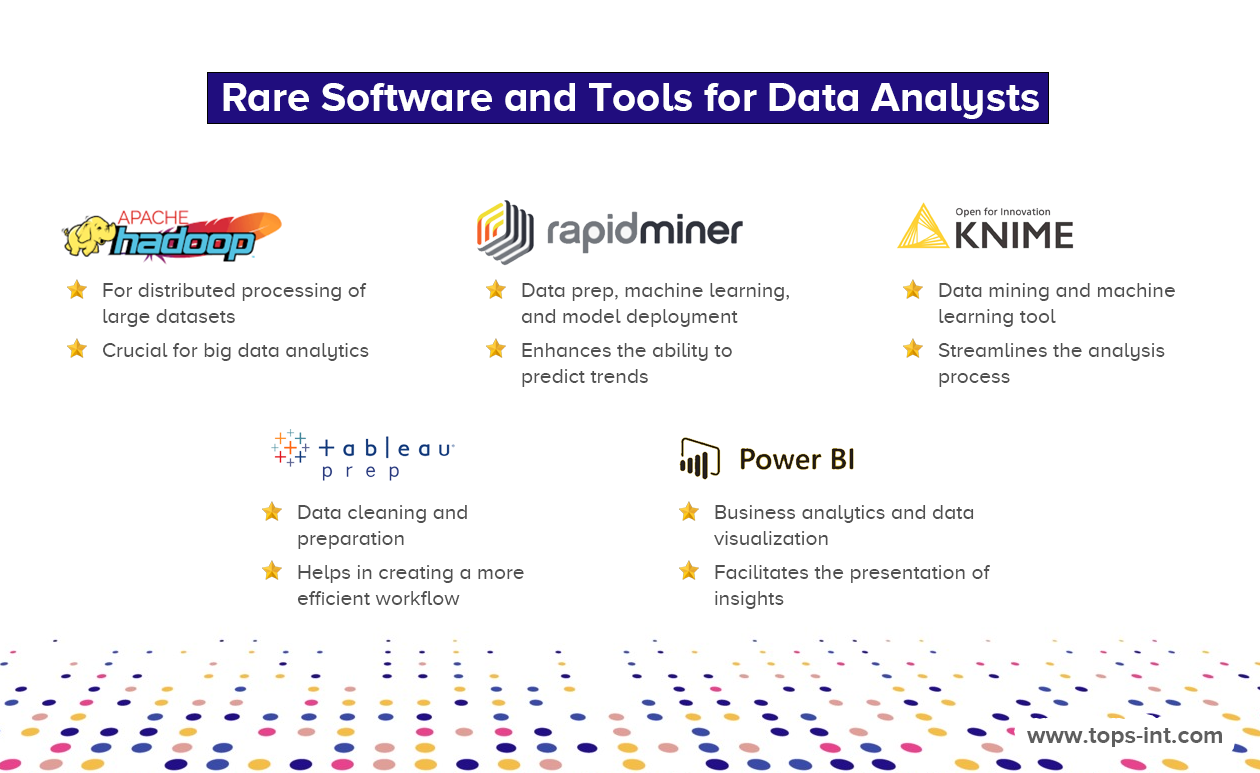
Step 2: Master Data Analysis Tools and Technologies
In the world of data analysis, mastering certain tools and technologies is vital.
- Excel – Think of it as your Swiss Army knife. From organizing and cleaning data to conducting preliminary analysis, Excel is a tool you'll use often.
- SQL – This is your go-to tool for extracting and manipulating data stored in databases. Understanding SQL is like learning how to fish; it provides sustenance in the data analysis ocean.
- Python and R – These programming languages are your paint brushes for creating in-depth analyses and models. They're both widely used, but you might prefer one over the other, just like some artists prefer oil paints while others lean towards acrylics.
- Data Visualization Libraries – They are like your cameras, capturing your hard work and presenting it in a visually pleasing and understandable way.
Mastering these tools is not an overnight task, but once done, they will empower you to navigate through your data analyst career more efficiently. You may enroll in a Data Analytics Certification Course to learn these concepts from scratch!
Step 3: Pursue Relevant Education
In Data Analysis, acquiring the right education is like having a roadmap for your journey.
Bachelor's Degree
Opt for a bachelor's degree in relevant fields such as computer science, statistics, mathematics, or data science. This will set the stage for your data analyst role.
Specialized Programs
If you already have a degree in a different field, don't worry. Many institutions offer specialized data analytics or data science programs. One standout option is TOPS Technologies, well known for its online courses that prepare students for real-world challenges.
Education is a crucial step in becoming a data analyst. It equips you with theoretical knowledge to aid you in practical scenarios.
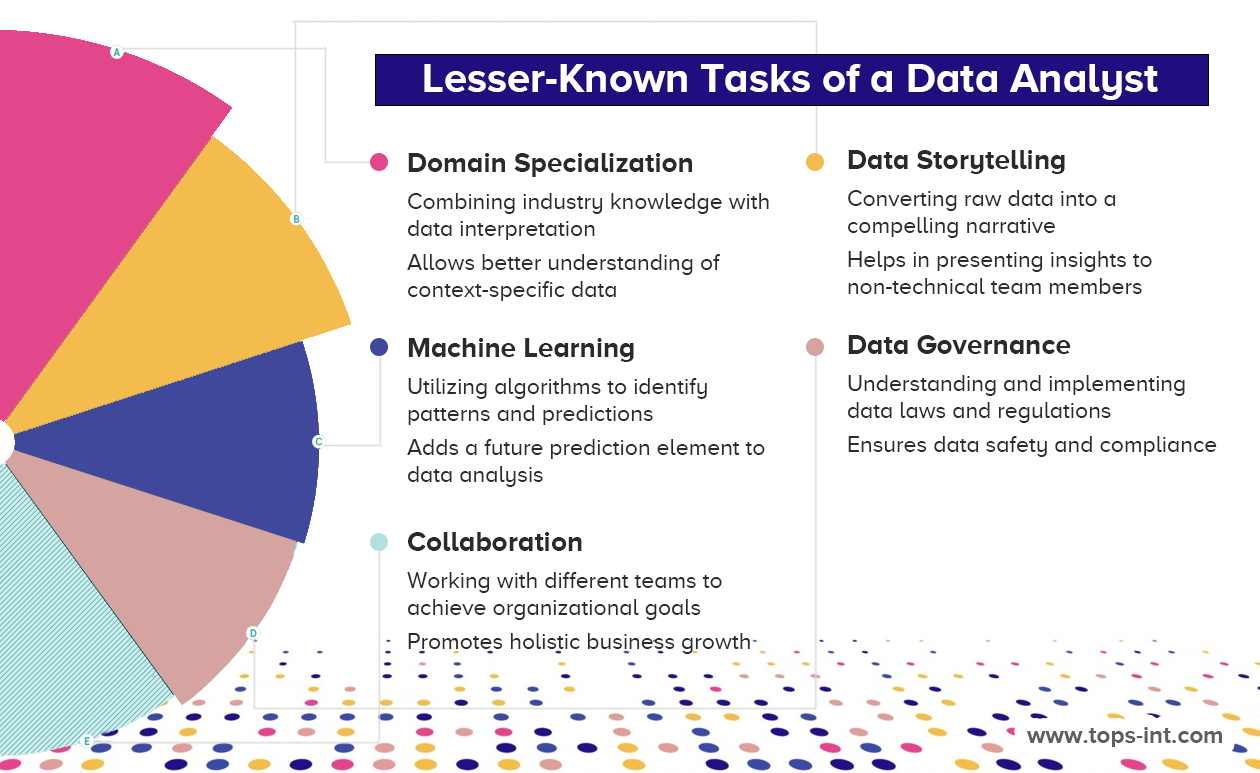
Step 4: Gain Practical Experience
After equipping yourself with knowledge and skills, it's time to roll up your sleeves and get some real-world experience.
Nothing beats hands-on experience. Here's how you can get it:
Internships and Part-time Jobs
Look for internships or part-time roles involving data analysis tasks. They will provide invaluable exposure to real-world scenarios.
Volunteer Opportunities
Volunteering for data analysis tasks in non-profit organizations can also provide excellent experience while contributing to a good cause.
Personal Projects
Create your projects. It could be analyzing social media trends, sports statistics, or anything that interests you. This not only sharpens your skills but also helps to create a robust portfolio.
Data Analysis Competitions
Participate in data analysis competitions. They challenge your skillset and offer a fantastic learning experience.
Remember, every piece of experience counts. It's about learning new skills and understanding how to apply them in various contexts.
Step 5: Develop Analytical and Problem-Solving Skills
Your progression on the path to becoming a data analyst requires more than mastering the necessary tools and gaining practical experience. It demands cultivating certain intrinsic skills, notably analytical and problem-solving abilities. Here are a few suggestions on how to develop these essential skills:
Engage with Real-World Data Problems
It is beneficial to immerse yourself in scenarios that corporations frequently encounter. These might involve sales improvement, customer behaviour comprehension, or trend prediction. Tackling such problems will aid in augmenting your analytical thinking.
Utilize Online Datasets
The internet is brimming with datasets covering a plethora of topics. Task yourself with gleaning meaningful insights from these resources. Not only does this practice fortify your analytical prowess, but it also expands your knowledge across a multitude of areas.
Enrol in a reputed
IT Training institute like TOPS Technologies and you will get the best Data Analytics Courses. You can learn everything from scratch and master every element of Data Analysis!
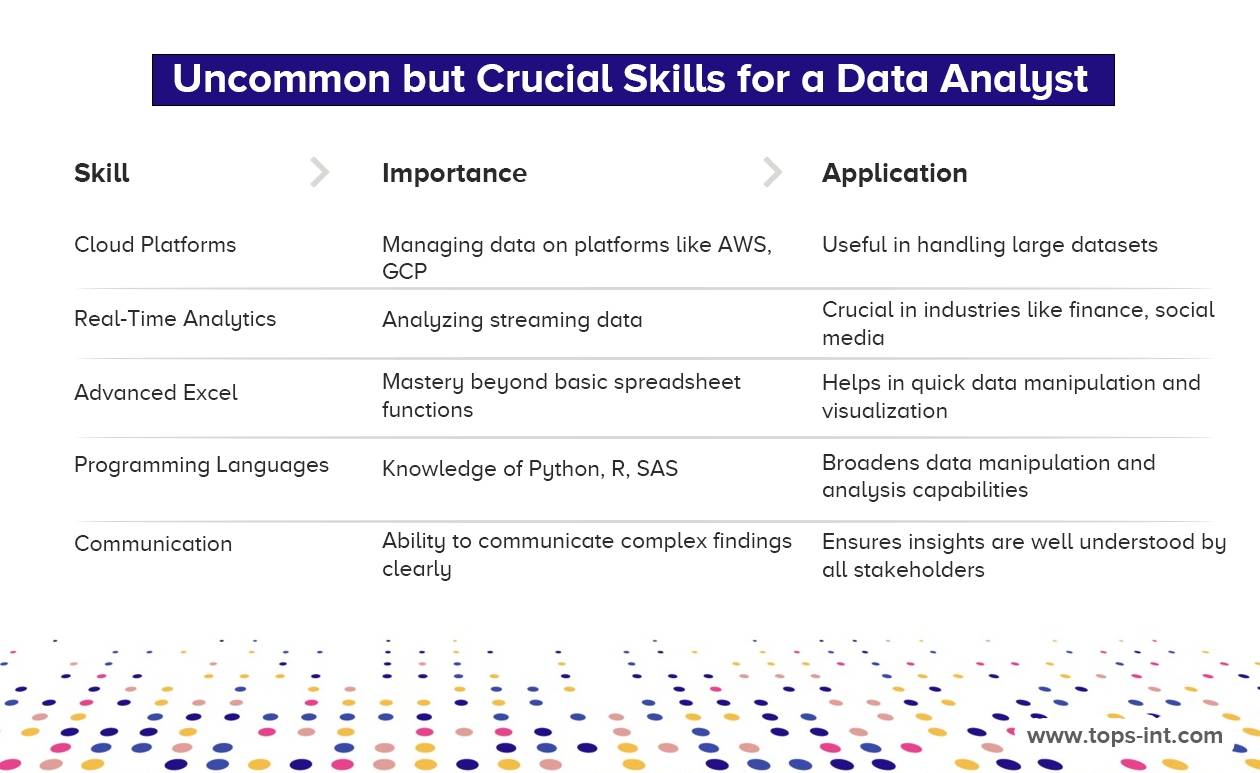
Step 6: Network and Connect with Data Professionals
In the ever-evolving field of data analysis, networking can be a game-changer. Here's how to connect with professionals:
Attend Data-Related Events
There are numerous data-related events, conferences, and meetups happening around the globe. They present an excellent opportunity to learn about the latest trends and insights in the industry.
Join Professional Groups and Forums
Online platforms like LinkedIn and industry-specific forums can connect you to a vast network of data professionals. Active participation can lead to valuable exchanges of ideas and knowledge.
Engage with Industry Professionals
Don't shy away from initiating conversations with seasoned professionals in the field. Their advice on navigating your career path can prove to be a real boon.
Collaborate on Projects
Collaboration on data analysis projects can lead to both learning and networking opportunities. It allows you to showcase your skills and build relationships.
Remember, networking is not just about landing the next job. It's about building relationships, learning from others' experiences, and staying updated in this fast-paced industry.
Step 7: Apply for Data Analyst Positions
It's time to employ all of the knowledge and expertise you've gained thus far. The following describes how to proceed:
Create a Resume
Make sure to carefully edit your CV to highlight your data analysis abilities and expertise. Always keep in mind that your resume serves as your initial impression, so be sure to emphasise your most important accomplishments and qualities.
Send your resume to entry-level positions
Look for positions for entry-level data analysts. They may serve as the ideal launching pad into the field.
Internships
When you're just starting out, internships may be a wonderful learning opportunity. They provide a realistic perspective of the workplace and often result in full-time possibilities. Many
Data Science Courses in Ahmedabad provide internship opportunities for you.
Getting Ready for Interviews
When interviewing, be prepared to discuss your work and experiences. Refresh your technical knowledge and be ready to demonstrate your problem-solving skills.
It might be intimidating to apply for jobs, but keep in mind that every application you submit moves you one step closer to getting your ideal data analyst job. Success will come if you are persistent and patient.
Step 8: Ace the Interview
Interviews can be nerve-wracking, but with the right preparation, you can turn them into opportunities to shine. Here's what you should do:
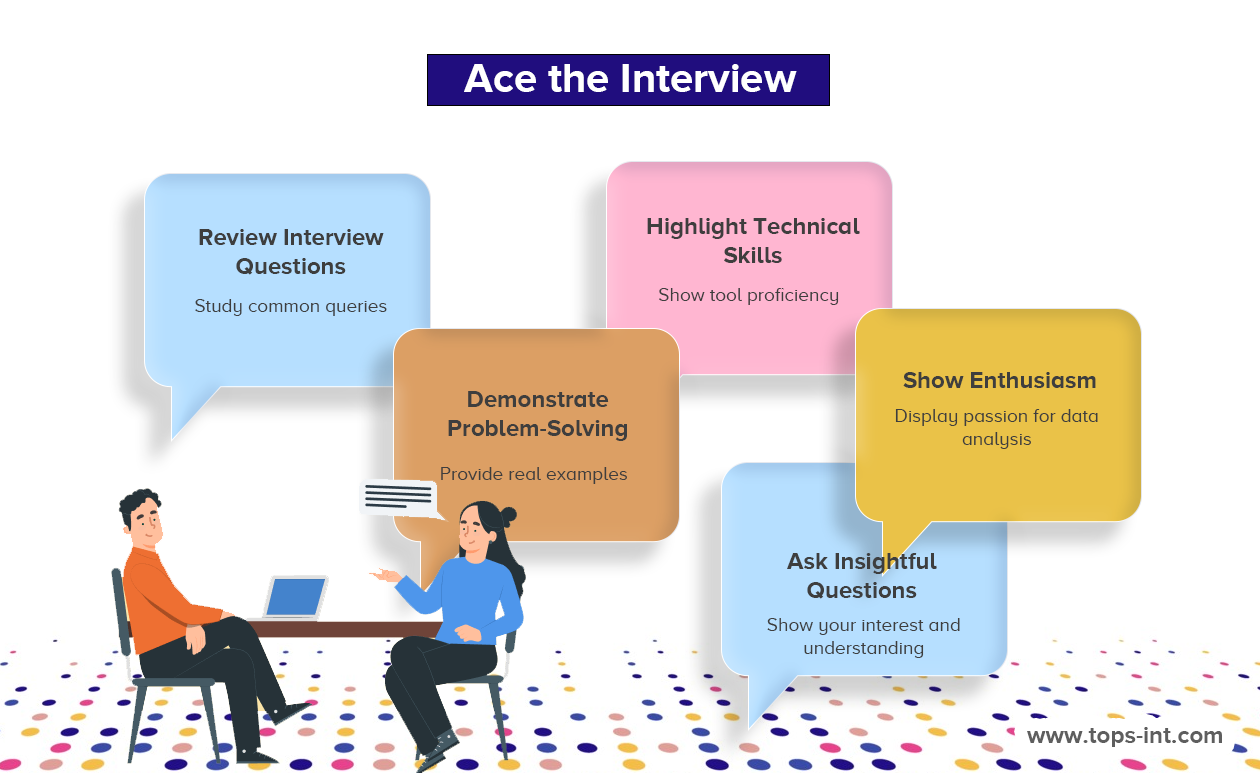
Conclusion
The demand for data analysts in India is witnessing an unprecedented surge. As per the reports, there has been a 50% growth in jobs in the data analytics field in the last year alone.
When it comes to salary, data analysts are earning significantly more now than before. The average pay for entry-level data analysts has seen a rise of about 15% compared to the previous year.
Furthermore, acquiring a degree or certification from a recognized institution like
TOPS Technologies can give you a considerable edge. In fact, professionals who have completed a
Data Analyst Course show a 35% increase in their salary package compared to those without formal training.
FAQs
What is the first step to becoming a data analyst?
The first step is to develop a strong foundation in mathematics and statistics.
Can I take a Data Analyst course in Ahmedabad?
Yes, TOPS Technologies in Ahmedabad offers a comprehensive Data Analyst course suitable for beginners and professionals.
What skills do I need to become a data analyst?
You need to master data analysis tools and technologies, have a strong foundation in mathematics and statistics, and possess excellent analytical and problem-solving skills.
How to gain practical experience in data analysis?
Engage in internships, part-time jobs, or personal projects related to data analysis to gain practical experience.
Is a degree necessary to become a data analyst?
While a relevant degree can be advantageous, practical skills, experience, and a strong understanding of data analysis tools are paramount.




